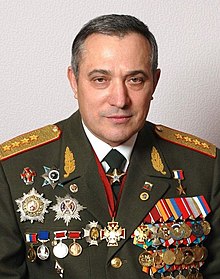Anatoly Kvashnin
This article includes a list of general references, but it lacks sufficient corresponding inline citations. (January 2013) |
Anatoly Vasiliyevich Kvashnin | |
|---|---|
 | |
| Born | 15 August 1946 Ufa, Bashkir ASSR, Russian SFSR, Soviet Union |
| Allegiance | |
| Service | |
| Years of service | 1969 – 2004 |
| Rank | Army General |
| Commands | General Staff of the Armed Forces of the Russian Federation |
| Other work | Presidential Envoy to the Siberian Federal District |
General of the Army Anatoly Vasiliyevich Kvashnin (Template:Lang-ru; born 15 August 1946, Ufa) was the Chief of the Russian General Staff from 1997 to 2004, when he was dismissed by President Vladimir Putin.
Kvashnin graduated from the Kurgan Machine-building Institute in 1969 and served in the armed forces from this time. He began serving in the military as deputy commander of a tank company then moved on to hold various command and staff positions. He later attended the Malinovsky Tank Academy graduating in 1976. It was reported that he commanded the 78th Tank Division in the Central Asia Military District from 1982 to 1987.[1] He graduated from the USSR Armed Forces General Staff Academy in 1989. He holds a candidate degree in sociological sciences, a doctorate in military sciences and is a corresponding member of the Russian Academy of Missile and Artillery Science.
Kvashnin had previously served as commander of the North Caucasus Military District. As of 2007, he served as the President's Representative in the Siberian Federal District.
As Chief of the Russian General Staff he had some success in reforming the command structure for the strategic deterrent forces, but feuded with Defence Minister Sergei Ivanov and many of his subordinates. Kvashnin also proved to be indecisive at times, he split then merged the Volga-Urals Military District, combined the Strategic Rocket Forces with the Russian Space Forces and the Early Warning System, then restored their independence.
Honours and awards
- Hero of the Russian Federation (27 October 1999)
- Order of Merit for the Fatherland;
- 2nd class
- 3rd class (19 July 2004) – for great contribution to strengthening national defence and many years of conscientious service
- 4th class
- Order of Courage
- Order of Honour (21 August 2006) – a contribution to strengthening Russian statehood and many years of conscientious service
- Order for Service to the Homeland in the Armed Forces of the USSR, 3rd class
- Medal "In Commemoration of the 850th Anniversary of Moscow"
- Medal of Merit in the All-Russia Census
- Jubilee Medal "In Commemoration of the 100th Anniversary since the Birth of Vladimir Il'ich Lenin"
- Medal "Veteran of the Armed Forces of the USSR"
- Medal "For development of virgin lands"
- Jubilee Medal "50 Years of the Armed Forces of the USSR"
- Jubilee Medal "60 Years of the Armed Forces of the USSR"
- Jubilee Medal "70 Years of the Armed Forces of the USSR"
- Medal "June 12, 1999 Bosnia-Kosovo" from nickel silver for number 1 (2000, Russian Ministry of Defence)
- Medal "For Military Merit", 1st class
- Medal "For Strengthening Military Cooperation"
- Medal "For diligence in carrying out engineering tasks"
- Order of the Holy Prince Daniel of Moscow (Russian Orthodox Church, 2000)
- Officer of the Legion of Honour (France, 2004)
- Order of the Yugoslav Star (Serbia and Montenegro)
- Honorary Citizen of Makhachkala (2000)
References
External links
- 1949 births
- Living people
- Heroes of the Russian Federation
- Recipients of the Order "For Merit to the Fatherland", 2nd class
- Recipients of the Order of Courage
- Recipients of the Order of Honour (Russia)
- Recipients of the Order of Holy Prince Daniel of Moscow
- Officiers of the Légion d'honneur
- People from Ufa
- People of the Chechen wars
- Generals of the army (Russia)
- Soviet major generals
- Medvedev Administration personnel
- Military Academy of the General Staff of the Armed Forces of the Soviet Union alumni
